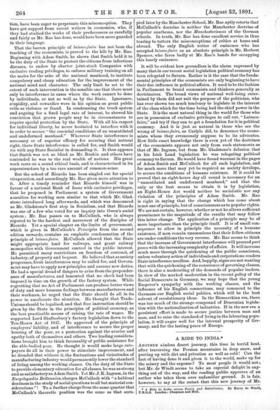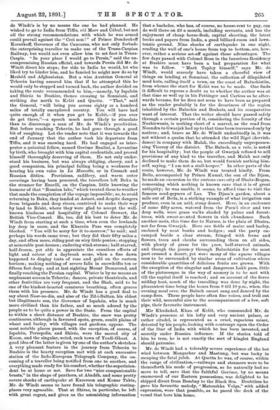A RIDE TO INDIA.*
ANOTHER aimless desert journey, this time in torrid heat, after traversing the Persian mountains in deep snow, and putting up with dirt and privation as well as cold ! Can the fact of having done it and given it to the world, make up for the misery and the expense P To moat people it would not; ' but Mr. de Windt seems to take an especial delight in any- thing out of the way, and the reading public approves of an author who takes them over unfamiliar ground. It is fair, however, to say at the outset that this new journey of Mr.
• A Bid• to India across Berea and Baluchistan. By Harry de Windt. F.R.G.B. London : Chapman and Hall. de Windt's is by no means the one he had planned. He wished to go to India from Tiflis, aid Mery and Cabal, but not all the strong recommendations with which he was armed could prevail against the " Ceci non !" of Prince Dondoukoff Korsakoff, Governor of the Caucasus, who not only forbade the enterprising traveller to make use of the Trans-Caspian Railway, but would not even allow him to set foot in Trans- Caspia. " In your place I would go to Persia," said the un- compromising Russian official, and towards Persia did Mr. de Windt direct his steps ; for ride to India he would, let who liked try to hinder him, and he fancied he might now do so by Meshed and Afghanistan. But a wise Austrian General at Teheran having assured him that if he attempted this he would only be stopped and turned back, the author decided on taking the route recommended to him,—namely, by Ispahan and Shiraz to Bushire, thence crossing to Sonmiani, and striking due north to Kelat and Quetta. " That," said the General, " will bring you across eighty or a hundred miles of totally unexplored country. You will have had quite enough of it when you get to Kelat,—if you ever do get there,"—a speech much more likely to stimulate than to discourage a man of Mr. de Windt's proclivities. But before reaching Teheran, he had gone through a good bit of roughing. Let the reader note that it was towards the end of January that the author took his departure from Tiflis, and it was snowing hard. He had engaged as inter- preter a quizzical fellow, named Gerome Realini, a Levantine by birth, who brought with him capital credentials, and proved himself thoroughly deserving of them. He not only under- stood his business, but was always obliging, cheery, and a good companion, his principal failing being a weakness for hearing his own voice in La Maseotte, or in Cossack and Russian ditties. Provisions, saddlery, and warm outer coverings having been procured, the travellers left Baku in the steamer for Enzelli, on the Caspian, little knowing the humour of, that "Russian lake," which treated them to weather that made the completion of the voyage impossible ; so, to avoid returning to Baku, they landed at Astara, and despite dangers from brigands and deep rivers, contrived to make their way by land to Resht, where they were glad to accept the well- known kindness and hospitality of Colonel Stewart, the British Vice-Consul. He, too, did his best to deter Mr. de Windt from starting at such a time, when even the lowlands lay deep in snow, and the Kbarzan Pass was completely blocked. " Yon will be sorry for it to-morrow," he said; and perhaps his words came true ; but they did their fifty miles a day, and often more, riding post on wiry little ponies ; stopping at miserable post-houses ; enduring wind-storms ; half-starved, half-frozen, yet able to appreciate the countless effects of light and colour of a daybreak scene, when a fine dawn happened to display tints of rose and gold on the eastern horizon ; making nothing of severe falls in snowdrifts ten or fifteen feet deep ; and at last sighting Mount Demavend, and finally reaching the Persian capital. Winter is by no means an unpleasant season in Teheran; dances, private theatricals, and other festivities are very frequent, and the Shah, said to be one of the kindest-hearted creatures breathing, often graces them with his presence. Mr. de Windt has a good deal to say about Nasr-oo-din, and also of the Zil-i-Sultan, his eldest but illegitimate son, the Governor of Ispahan, who is much more civilised than his father, and so much adored by the people as to be quite a power in the State. From the capital to within a short distance of Bushire, the snow was pretty continuous, although in favoured spots, green, sunlit plains of wheat and barley, with villages and gardens, appear. The most notable places passed, with the exception, of course, of Ispahan, Persepolis, and Shiraz, were the sacred city of Koom, and the singular, weird, rock town of Yezdi-Ghazt. A good idea of the latter is given by one of the author's sketches. A very pleasant feature in the journey from Teheran to Bushire is the hearty reception met with at each successive station of the Indo-European Telegraph Company, the on- coming of a traveller being notified from one to another, and everything made ready for his comfort, whether the snperinten-
' dent be at home or not. Save for two "nice companionable beasts," in the shape of panthers, at Abad6h, and some pretty severe shocks of earthquake at Kazeroon and Konar Takta, Mr. de Windt seems to have found his telegraphic resting- places very agreeable. That at Shiraz, in particular, he left with great regret, and gives us the astonishing information
that a bachelor, who has, of course, no house-rent to pay, can do well there on 26 a month, including servants, and has the enjoyment of cheap horse-flesh, capital shooting, the latest books and papers from India, a good billiard-room and lawn. tennis ground. Nine shocks of earthquake in one night, rending the wall of one's house from top to bottom, are, how- ever, rather a serious set-off against these advantages. The few days passed with Colonel Ross in the luxurious Residency at Bushire must have been a bad preparation for what was to follow. " Mark Tapley himself," says Mr. de Windt, would scarcely have taken a cheerful view of things on landing at Sonmiani, the collection of dilapidated mud huts, calling itself a town, on the coast of Baluchistan, from whence the start for Kelat was to be made. One finds it difficult to repress a doubt as to whether the author was at that time so well up in his Pottinger and Carless as he after- wards became, for he does not seem to have been as prepared as the reader probably is for the dreariness of the region inhabited by the Baluchis and Brahuis, and its comparative want of interest. That the writer should have passed safely through a certain portion of it, considering the ferocity of the Nushirwanis, is nothing short of a marvel, as the road from Noundra to Gwarjak had up to that time been traversed only by natives ; and, brave as Mr. de Windt undoubtedly is, it was not without a qualm that he attended the wild Zigri (dervish- dance) in company with Malak, the exceedingly unpreposses- sing Viceroy of the district. The Baluch, as a rule, is noted for his hospitality ; but the people of Gwarjak refused to sell provisions of any kind to the traveller, and Malak not only declined to make them do so, but would furnish nothing him- self, saying, " I am not a stall-keeper." In other parts of the route, however, Mr. de Windt was treated kindly. From Bella, accompanied by Prince Kumal, the son of the Djam, he made an excursion to the curious cave-city of Shahr-Rogan, concerning which nothing is known save that it is of great antiquity; he was unable, it seems, to afford time to visit the famous mud-geysers of Las. The Djam's garden, about a mile out of Bella, is a striking example of what irrigation can produce, even in an arid, stony desert. Here, in an enclosure of some fifty acres, watered from the Pura1i river and two deep wells, were grass walks shaded by palms and forest- trees, with sweet-scented flowers in rich abundance. Such another oasis, this time due to Nature, is the plain of Dhaira, not far from Gwarjak. Here are fields of maize and barley, enclosed by neat banks and hedges ; and the party en- camped beside a clear stream, fringed with ferns and flowers, trees and shrubs surrounding them on all sides, with plenty of grass for the poor, half-starved animals, and though the journey through Baluchistan for the most part crossed a desert, yet were many of the sparse villages seen to be surrounded by similar areas of cultivation where considerable quantities of delicious fruits are grown. With the exception of the singular and dangerous Lakh pass, little of the picturesque in the way of scenery is to be met with till the capital itself is reached ; and on account of the fierce midday heat, much of the travelling was done by night, the pleasantest time being the hours from 8 till 10 p.m., when, the evening meal over, the Baluch escort sang and danced by the camp-fires. These people have often fine voices, and troll out their wild, mournful airs to the accompaniment of a low, soft pipe, their favourite instrument.
Mir Khudadad, Khan of Kelit, who commanded Mr. de Windt's presence at his lofty and very ancient palace, or rather citadel, is represented as a cruel, rapacious miser, detested by his people, looking with contempt upon the Order of the Star of India with which he has been invested, and secretly under Russian influence. If the stories told of him be true, he is not exactly the sort of kinglet England should patronise.
Mr. de Windt had a tolerably severe experience of the hot wind between Mangachar and Mastung, but was lucky in escaping the fatal juloh. At Quetta he was, of course, within the range of civilisation,—railways and steamers were to be thenceforth his mode of progression, so he naturally had no more to tell, save that the faithful Ger8me, by no means enamoured of our Eastern possessions, was delighted to be shipped direct from Bombay to the Black Sea. Doubtless he gave his favourite melody, " Matouslika Volga," with added expression, were that possible, as he paced the deck of the vessel that bore him home.



































 Previous page
Previous page